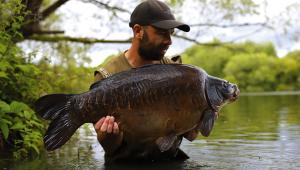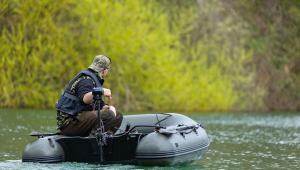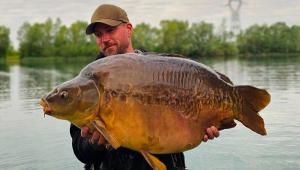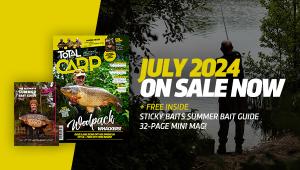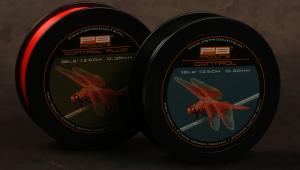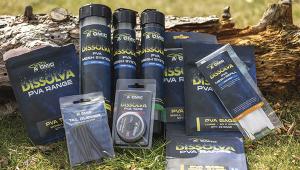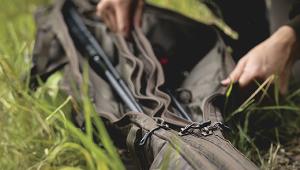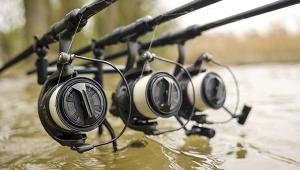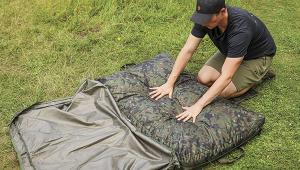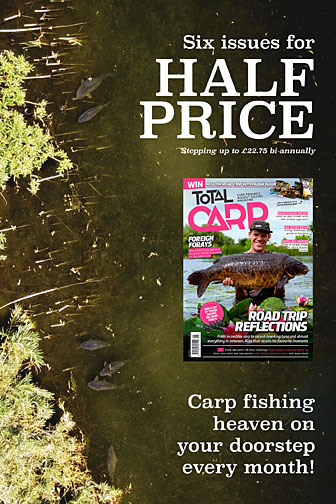Three pop-up presentations, for every need!
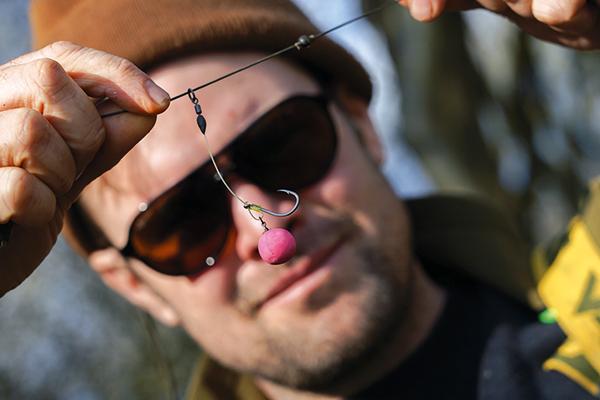
Throughout the months of spring I will often find myself using solely pop-up rigs and not a lot else. This is due to the lack of feeding activity throughout the winter, causing a build-up of detritus on the lake bed. You will also find that the carp, having just woken up, are very active, moving all around the pond cleaning themselves off and exploring areas of the lake that have been neglected during the colder times.
With this being the case, a pop-up presentation lends itself perfectly to these situations; you won’t necessarily be fishing to known spots, but areas where a bottom bait/wafter would get snarled up in debris/weed that may be present on the bottom.
Chods, the ultimate rig for chucking anywhere?
I feel like in this day and age with rigs developing more and more, the chod rig often gets forgotten or neglected, when in reality it is often the perfect rig for the majority of spring fishing. What makes it the perfect rig? Well, for example, say you have turned up at a venue and have spotted a few fish showing; if you haven’t fished that area before and are unsure of what’s out there, maybe there are no clean areas at all and it isn’t presentable with most setups, rather than taking a risk with a standard pop-up presentation or even a bottom bait this is where the chod rig comes into its own. Rather than casting around for ages trying to find something clean to fish over and probably spooking your quarry by doing so, the chod rig enables you to have one cast and know you stand a very good chance of having a great presentation.

When using a chod it also enables you to use light leads, especially when using leadcore as you’re not actually relying on the lead to hook the fish, the leadcore that will get caught up in the fronds of the weed will often aid the hooking, meaning the lead is almost irrelevant, so you can get away with using the lightest lead possible to get you out to the zone where the fish are showing. You can either fish the chod running the full length of your leader if you’re unsure of how thick the weed is, or if you have a rough idea of what’s out there you can position the beads at the depth you believe is suitable. You can also use them naked on the line, but I feel you need to rely on the weight of the lead more in this situation, as main line is supple whereas leadcore has some rigidity, meaning there is a lot less resistance when a fish picks up your pop-up.
The hinge
Over the years the stiff hinge rig has been classed as a big-carp rig, accounting for lots of huge fish around the country. There are a lot of ways to tie a hinge up, using different materials for the boom section to suit certain situations, but one I always end up going back to is having a fluorocarbon boom of IQ2 – it’s plenty stiff enough to kick everything away from the lead as it settles on the bottom, but also soft enough to help follow the contours of the lake bed too.

Situations where I would use the hinge would normally be over an area where I can present a couple of rods and use a spread of boilies; again it’s quite a neglected method in recent times as a lot of people have the perception that spodding on a bin lid sized spot is the best way to catch them, when in reality if you can get them feeding on a spread of boilies and actively moving/searching those baits out they become a lot easier to catch, as a mobile carp is more catchable than one sitting on a spot sifting through tiny food particles. This lends itself perfectly for spring fishing as the fish are very active, so stumbling across a boilie here and there will make them much more inclined to have a little feed as they’re not looking to eat loads, hopefully one of the baits the carp decide to pick up has a size 4 hook in and then it’s game on.
The hinge is the perfect setup for using on a helicopter rig and fishing over low lying debris, whether that be soft silt or silkweed, it suits that style of lake bed perfectly over a blatant hard gravel spot. Although you can tie the hinge up really short, I think it’s more efficient when used in between one to two inches off the deck. Places to avoid using it would be in areas of Canadian pondweed or other similar areas of weed growth; due to the way these types of weed grow it can massively hinder your presentation and often cause the rig to sit up out of the weed due to the boom section. In these situations a choddy would definitely be more suited.
Spinners are a winner
Prebaiting pays a huge part in my angling and always has done, I think it puts you at a much greater advantage of getting bites when you come to do your session, and the more often you can get down the lake to put a bit in the better. After a few regular bait-up trips hopefully the spots will start to get nice and clean from any feeding activity from the carp, birds and any nuisance species. At this point in time, I want to invite everything to the party to get the spots glowing ready for when I think the time is right.

When fishing clean blatant areas, a bottom bait or wafter would certainly be my go-to in the summer and autumn, but with the fish still being a bit naive after their winter slumber, a hi-viz pop-up will still score well on the hard spots, but I like to position it as low to the bottom as I can. The spinner rig has made an appearance over the last few years and its popularity has grown massively, with me included jumping on the bandwagon – it’s very efficient and so quick to tie, making it a no-brainer for me.
It sits so close to the bottom making it the perfect pop-up rig for fishing over those more obvious clean areas, not only that but you can use it as a wafter presentation. Although you can use it as a single hook bait tactic, I much prefer to use it when fishing over a bit of bait, so it suits the prebaited zones perfectly. Before the water gets too warm, I often fish a lot of little bits in the mix – small boilies, corn, pellets and naturals like maggots/casters, but as soon as the water temperature increases I will up the size of my loose feed to deter any nuisance species. With the spinner presentation being less ‘bulky’ than say a choddy/hinge, it also enables me to use a smaller pop-up like a 12mm NS1 to suit the food items that I’m feeding.
Choosing the right pop-up
When using pop-up presentations, I find it incredibly important to suit the hook bait to the rig you’re using. Buoyancy can play a huge part in making a rig effective or even hindering your presentation; for example, if I’m using a hinge or choddy then I will always use a 13/14mm + pop-up – the + means extra buoyant, so I can ensure with all the extra metal and material it needs to hold up that the pop-up is going to do its job for the period I need it to. It also enables me to leave the rig in positions for a long time if needed, I’ve used them for 48 hours before with no problems at all.

When using more subtle presentations like the spinner rig, I will often use a smaller 12mm pop-up; this still provides enough buoyancy to the rig, but also means I don’t have to drown the rig in tungsten putty to get it to sink, like I would if I was using a more buoyant larger pop-up. Spring is one of my favourite times of year to be out there chasing my quarry about, you can be extremely active and fish many swims throughout your session trying to keep on top of the carp, but the rewards are certainly there to be had, especially when using bright pop-ups.
- Log in or register to post comments
